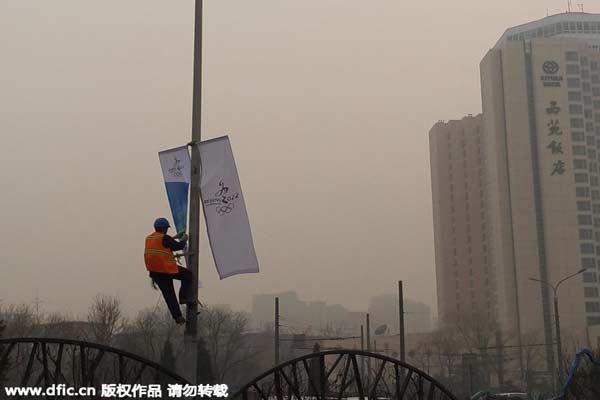 |
|
A worker puts a poster promoting Beijing's bid for the 2022 Winter Olympic Games on a lamp post. [Photo/IC] |
BEIJING -- Beijing accelerates its fight against air pollution as it ticks to 100-day countdown of the 2022 Winter Olympics city-deciding vote.
Li Zhu (a pseudonym) and his colleagues stood in front of a distinctive chimney on Chang'an Avenue in downtown Beijing, waiting to take one last group picture.
Li was about to bid farewell to Guohua Beijing Thermal Plant, once a major pillar in Beijing's heating system. The plant, whose chimney soars 240 meters into the sky, was shuttered under a government plan recently.
"I have been working here for more than three decades, so it's hard to say goodbye," Li told the Beijing News.
Beijing has renewed its pollution-fighting efforts, including closing a series of coal power plants, to bring back "APEC Blue" -- a phrase coined by Chinese netizens to describe the city's clear skies during the Asia-Pacific Economic Cooperation (APEC) meetings in November.
The efforts are badly needed in Beijing, a city frequently enveloped in acrid smog, particularly as the capital and Zhangjiakou in neighboring Hebei Province pursue a joint bid for the 2022 Olympic Winter Games.
According to official figures, the plant's closure will help slash Beijing's coal usage by 1.3 million tonnes, or 14 percent of Beijing's total goal for the year, and cut emissions of sulfur dioxide, nitric oxide and dust by 1,410 tonnes, 2,690 tonnes and 420 tonnes respectively.
Guohua is not the only thermal plant to fade into history. Its shutdown came a day after the closure of another 93-year-old thermal power plant run by Beijing Energy Investment Group in western Beijing. Of the four major coal-fired power plants in Beijing, three have been closed so far and the last is scheduled to be closed next year.